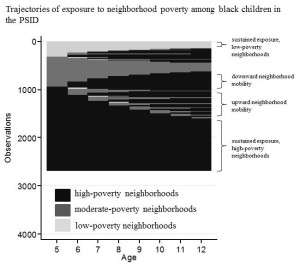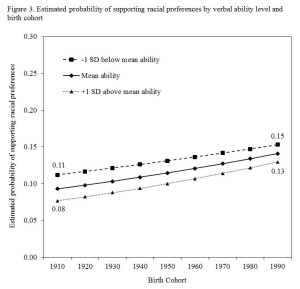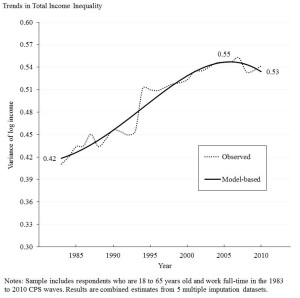Neighborhood Effects
 Growing up in an impoverished neighborhood is thought to have a harmful impact on child development above and beyond the well-documented negative effects of family poverty. My research in this area considers the temporal and developmental dimensions of so-called “neighborhood effects.” Specifically, this research program adapts novel methods of causal inference for time-varying exposures to study how residence in different neighborhood environments throughout the early life course impact child developmental outcomes, such as educational attainment and adolescent childbearing. Based on this approach, findings suggest that neighborhood poverty may have a far more severe impact on child development than previously documented. In addition, findings suggest that exposure to neighborhood poverty, particularly during adolescence rather than early childhood, is more consequential for children from poor families than for children from middle class families.
Growing up in an impoverished neighborhood is thought to have a harmful impact on child development above and beyond the well-documented negative effects of family poverty. My research in this area considers the temporal and developmental dimensions of so-called “neighborhood effects.” Specifically, this research program adapts novel methods of causal inference for time-varying exposures to study how residence in different neighborhood environments throughout the early life course impact child developmental outcomes, such as educational attainment and adolescent childbearing. Based on this approach, findings suggest that neighborhood poverty may have a far more severe impact on child development than previously documented. In addition, findings suggest that exposure to neighborhood poverty, particularly during adolescence rather than early childhood, is more consequential for children from poor families than for children from middle class families.
Racial Attitudes
 An important theoretical perspective in the study of racial attitudes is that prejudice, negative stereotypes, and opposition to different programs designed to realize racial equality are structured by intergroup conflict over material resources and the objective group interests that emerge within this competition. My research in this area investigates the implications of this theoretical framework for understanding the effects of institutions, such as the formal education system, and individual faculties, like cognitive ability, on different types of racial attitudes. Although it is commonly assumed that a more advanced formal education and more sophisticated cognitive abilities attenuate prejudice, breakdown negative stereotypes, and promote support for policies designed redress racial inequality, my research suggests that education and cognitive ability may not be so “enlightening” after all, at least when it comes to certain types of racial attitudes. Evidence suggests that individuals with higher levels of education and more advanced cognitive abilities are substantially more likely to reject negative racial stereotypes and support racial equality in principle, but these same individuals are often no more likely, and in some cases significantly less likely than their poorly educated and less intelligent counterparts, to support policies designed to realize racial equality in practice.
An important theoretical perspective in the study of racial attitudes is that prejudice, negative stereotypes, and opposition to different programs designed to realize racial equality are structured by intergroup conflict over material resources and the objective group interests that emerge within this competition. My research in this area investigates the implications of this theoretical framework for understanding the effects of institutions, such as the formal education system, and individual faculties, like cognitive ability, on different types of racial attitudes. Although it is commonly assumed that a more advanced formal education and more sophisticated cognitive abilities attenuate prejudice, breakdown negative stereotypes, and promote support for policies designed redress racial inequality, my research suggests that education and cognitive ability may not be so “enlightening” after all, at least when it comes to certain types of racial attitudes. Evidence suggests that individuals with higher levels of education and more advanced cognitive abilities are substantially more likely to reject negative racial stereotypes and support racial equality in principle, but these same individuals are often no more likely, and in some cases significantly less likely than their poorly educated and less intelligent counterparts, to support policies designed to realize racial equality in practice.
Income Inequality
 Income inequality has increased substantially in America since the early 1980s. My research in this area investigates the link between growing income inequality and social class, defined in terms of ownership and authority relations within the workplace. Using data from multiple different sources, I examine temporal changes in the ownership and authority structure of the American economy, estimate shifts in the income returns to ownership and authority over time, and link these changes to growth in aggregate income inequality. Findings suggest that incomes for those in positions of ownership and control in the American workplace have substantially increased since the early 1980s, while incomes for workers that lack ownership and authority in production have generally stagnated. This pattern of income divergence accounts for a nontrivial proportion of growth in income inequality at the population level, even after controlling for the potentially confounding influence of demographic change, occupational differentiation, and increasing returns to education.
Income inequality has increased substantially in America since the early 1980s. My research in this area investigates the link between growing income inequality and social class, defined in terms of ownership and authority relations within the workplace. Using data from multiple different sources, I examine temporal changes in the ownership and authority structure of the American economy, estimate shifts in the income returns to ownership and authority over time, and link these changes to growth in aggregate income inequality. Findings suggest that incomes for those in positions of ownership and control in the American workplace have substantially increased since the early 1980s, while incomes for workers that lack ownership and authority in production have generally stagnated. This pattern of income divergence accounts for a nontrivial proportion of growth in income inequality at the population level, even after controlling for the potentially confounding influence of demographic change, occupational differentiation, and increasing returns to education.